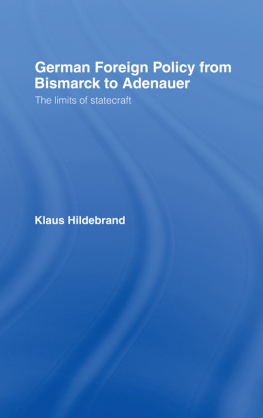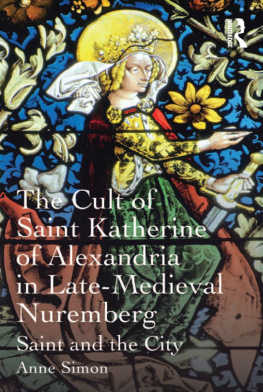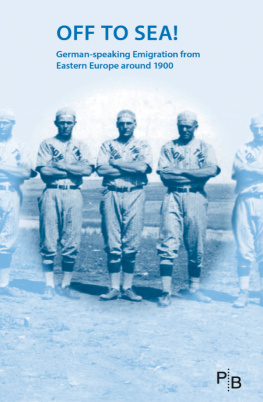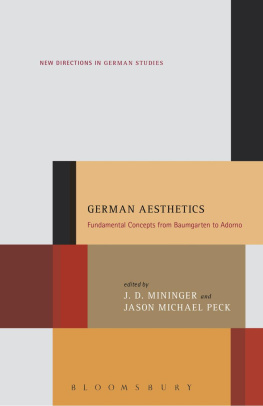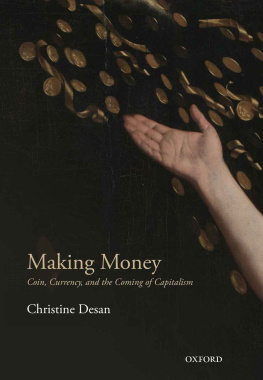MONEY IN THE GERMAN-SPEAKING LANDS
SPEKTRUM: Publications of the German Studies Association
Series Editor: David M. Luebke, University of Oregon
Published under the auspices of the German Studies Association, Spektrum offers current perspectives on culture, society, and political life in the German-speaking lands of central EuropeAustria, Switzerland, and the Federal Republicfrom the late Middle Ages to the present day. Its titles and themes reflect the composition of the GSA and the work of its members within and across the disciplines to which they belongliterary criticism, history, cultural studies, political science, and anthropology.
Volume 1
The Holy Roman Empire, Reconsidered
Edited by Jason Philip Coy, Benjamin Marschke, and David Warren Sabean
Volume 2
Weimar Publics/Weimar Subjects: Rethinking the Political Culture of Germany in the 1920s
Edited by Kathleen Canning, Kerstin Barndt, and Kristin McGuire
Volume 3
Conversion and the Politics of Religion in Early Modern Germany
Edited by David M. Luebke, Jared Poley, Daniel C. Ryan, and David Warren Sabean
Volume 4
Walls, Borders, Boundaries: Spatial and Cultural Practices in Europe
Edited by Marc Silberman, Karen E. Till, and Janet Ward
Volume 5
After The History of Sexuality: German Genealogies with and Beyond Foucault
Edited by Scott Spector, Helmut Puff, and Dagmar Herzog
Volume 6
Becoming East German: Socialist Structures and Sensibilities after Hitler
Edited by Mary Fulbrook and Andrew I. Port
Volume 7
Beyond Alterity: German Encounters with Modern East Asia
Edited by Qinna Shen and Martin Rosenstock
Volume 8
Mixed Matches: Transgressive Unions in Germany from the Reformation to the Enlightenment
Edited by David Luebke and Mary Lindemann
Volume 9
Kinship, Community, and Self: Essays in Honor of David Warren Sabean
Edited by Jason Coy, Benjamin Marschke, Jared Poley, and Claudia Verhoeven
Volume 10
The Emperors Old Clothes: Constitutional History and the Symbolic Language of the Holy Roman Empire
Barbara Stollberg-Rilinger
Translated by Thomas Dunlap
Volume 11
The Devils Riches: A Modern History of Greed
Jared Poley
Volume 12
The Total Work of Art: Foundations, Articulations, Inspirations
Edited by David Imhoof, Margaret Eleanor Menninger, and Anthony J. Steinhoff
Volume 13
Migrations in the German Lands, 15002000
Edited by Jason Coy, Jared Poley, and Alexander Schunka
Volume 14
Reluctant Skeptic: Siegfried Kracauer and the Crises of Weimar Culture
Harry T. Craver
Volume 15
Ruptures in the Everyday: Views of Modern Germany from the Ground
Andrew Stuart Bergerson and Leonard Schmieding
Volume 16
Archeologies of Confession: Writing the German Reformation 15172017
Edited by Carina L. Johnson, David M. Luebke, Marjorie E. Plummer, and Jesse Spohnholz
Volume 17
Money in the German-Speaking Lands
Edited by Mary Lindemann and Jared Poley
Money in the German-Speaking Lands
EDITED BY MARY LINDEMANN AND JARED POLEY

First published in 2017 by
Berghahn Books
www.berghahnbooks.com
2017, 2022 Mary Lindemann and Jared Poley
First paperback edition published in 2022
All rights reserved. Except for the quotation of short passages for the purposes of criticism and review, no part of this book may be reproduced in any form or by any means, electronic or mechanical, including photocopying, recording, or any information storage and retrieval system now known or to be invented, without written permission of the publisher.
Library of Congress Cataloging-in-Publication Data
Names: Lindemann, Mary, editor. | Poley, Jared, 1970 editor.
Title: Money in the German-speaking lands / edited by Mary Lindemann and Jared Poley.
Description: New York : Berghahn Books, 2017. | Series: Spektrum: publications of the German Studies Association ; volume 17 | Includes bibliographical references and index.
Identifiers: LCCN 2017014884 (print) | LCCN 2017030740 (ebook) | ISBN 9781785335891 (e-book) | ISBN 9781785335884 (hardback : alk. paper)
Subjects: LCSH: MoneyEurope, German-speakingHistory. | MoneyGermanyHistory. | Europe, German-speakingHistory. | GermanyHistory.
Classification: LCC HG922 (ebook) | LCC HG922 .M665 2017 (print) | DDC 332.4/943dc23
LC record available at https://lccn.loc.gov/2017014884
British Library Cataloguing in Publication Data
A catalogue record for this book is available from the British Library
ISBN 978-1-78533-588-4 hardback
ISBN 978-1-80073-449-4 paperback
ISBN 978-1-78533-589-1 ebook
https://doi.org/10.3167/9781785335884
CONTENTS
Mary Lindemann and Jared Poley
Johannes Dillinger
Vera Keller
Almut Spalding
Andre Wakefield
Eve Rosenhaft
Benjamin Marschke
Dennis Frey Jr.
Frank Hatje
Jan Carsten Schnurr
Jonathan Sperber
Elizabeth S. Goodstein
Erika L. Briesacher
Michael L. Hughes
Pamela E. Swett
Kraig Larkin
Armin Grnbacher
Ursula M. Dalinghaus
Michael J. Sauter
TABLES AND FIGURES
Tables
.
.
.
.
.
Figures
.
.
.
.
.
.
.
.
.
.
.
.
.
.
Introduction
MARY LINDEMANN AND JARED POLEY
The European Commission, the European Central Bank, and the International Monetary Fund agreed in May 2010 to provide a package of EUR 110 billion meant to provide financial assistance to Greece. More than EUR 22 billion of those came from Germany. This so-called first bailout (a second bailout package followed in 2012 and a third, worth EUR 86 billion, in August 2015), which was meant to confront the Greek government-debt crisis brought on by the housing bubble and the global recession, revealed the economic and political fault lines of the European Union and the eurozone. The bailout was represented in the German popular-right press as a catastrophe. Bild bluntly counseled in its headline of 27 October 2010: Sell your islands, you bankrupt Greeks and the Acropolis too! [Verkauft doch eure Inseln, ihr Pleite-Griechen und die Akropolis gleich mit!]. Money, these developments made clear, was the foundation and the lubricant of the New Europe.
These developments also make clear that Europeanization, in its current form, is organized and enacted through German money, and in that sense they form part of a longer historical trajectory of attempts to forge political unification with the tools of economic integration. Money in the German-Speaking Lands, therefore, follows this trajectory from the late Renaissance until the close of the twentieth century. While a good number of contributions emphasize the connection between economics and politics in German history, it also explores the cultural and symbolic aspects of money. The two paths are not parallel but intersect repeatedly in interesting and informative ways.
Next page

